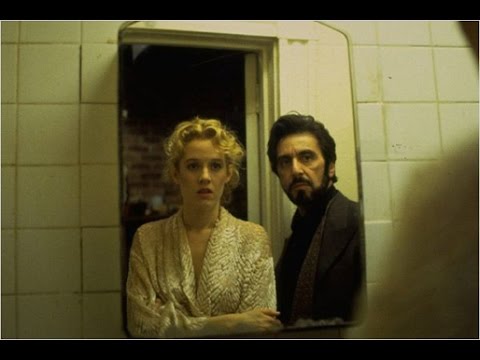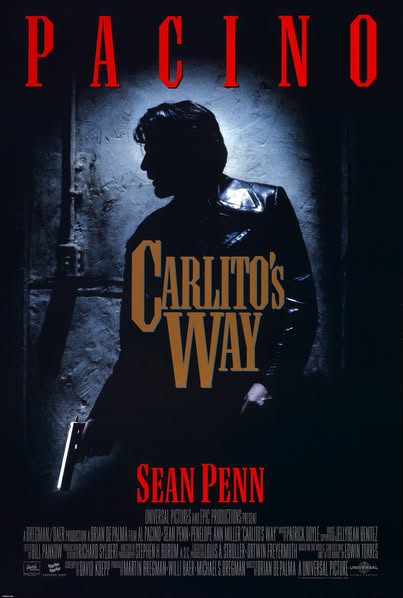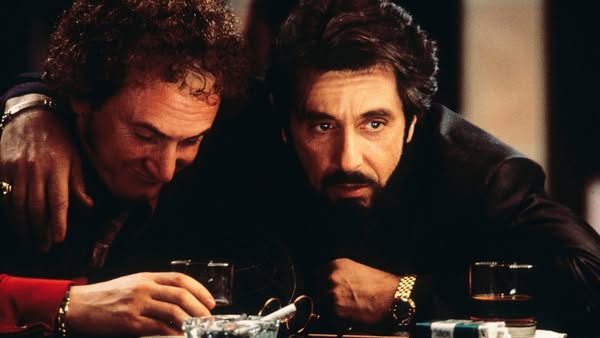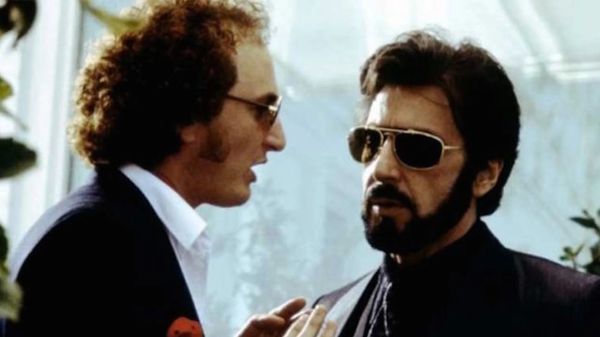Carlito’s Way (1993)

Carlito’s Way is a powerful crime drama that immerses viewers in the gritty underbelly of New York City’s criminal world during the 1970s and early 1980s. Released in 1993, the film is a compelling tale of redemption, choices, and the inescapable grip of the past, all brought to life through the masterful storytelling of its director. At the heart of the film is Al Pacino’s unforgettable portrayal of Carlito Brigante, a character whose journey from a life of crime to a desperate quest for a better future captivates audiences.
The narrative follows Carlito, a former drug lord who is released from prison after serving five years. Eager to distance himself from his violent past, he dreams of a peaceful life in Puerto Rico, far removed from the drug trade that once defined him. However, Carlito quickly learns that escaping his history is far more complicated than he had hoped. As he attempts to build a new life, he is drawn back into the dangerous world he desperately wishes to leave behind. The film intricately weaves together themes of loyalty, betrayal, and the moral complexities of living a life intertwined with crime.

One of the film’s central conflicts arises from Carlito’s relationship with his lawyer, Dave Kleinfeld, played by Sean Penn. Kleinfeld embodies the unpredictable nature of the criminal world, as he is both a friend and a potential threat to Carlito’s aspirations for a new life. This dynamic adds tension to the story, as Carlito must navigate his loyalty to Kleinfeld while recognizing the risks associated with their connection. The contrasting ambitions of the two characters illustrate the broader theme of choices and consequences that permeates the film.

In terms of cinematic style, the film showcases the signature visual flair of its director, characterized by dynamic camera movements and a carefully crafted atmosphere. The cinematography captures the vibrant yet dangerous streets of New York, immersing viewers in Carlito’s world. De Palma employs a range of techniques, such as long takes and strategic lighting, to heighten the tension and emotional stakes of the narrative. The film’s pacing allows for moments of introspection, enabling audiences to connect with Carlito’s internal struggles as he grapples with his past decisions.

The performances in Carlito’s Way are nothing short of remarkable. Al Pacino delivers a nuanced portrayal of Carlito, allowing viewers to empathize with his desire for redemption while recognizing the harsh realities of his situation. Pacino’s ability to convey vulnerability amidst the character’s tough exterior adds depth to the role, making Carlito a compelling and relatable figure. Sean Penn’s performance as Dave Kleinfeld is equally captivating, showcasing a character who oscillates between charm and danger. The chemistry between Pacino and Penn enhances the film’s emotional resonance, making their relationship a focal point of the narrative.

Moreover, the film’s exploration of themes such as redemption and the influence of fate resonates powerfully. Carlito’s struggle to break free from his past serves as a cautionary tale about the challenges of escaping one’s identity. The film suggests that, despite one’s best efforts, the past can be an inescapable force, shaping future choices and outcomes. This theme is poignantly illustrated in the film’s climax, where Carlito’s dreams of a new life collide with the realities of his former existence.
Carlito’s Way was well-received by critics and audiences alike, earning praise for its engaging storyline and strong performances. It has since become a classic within the crime genre, remembered for its emotional depth and stylistic brilliance. The film’s legacy endures, as it continues to resonate with viewers who appreciate its exploration of the complexities of human nature and the consequences of one’s choices.
In conclusion, Carlito’s Way is a striking and thought-provoking film that offers a rich exploration of crime, redemption, and the human condition. With Al Pacino’s masterful performance and a compelling narrative, it stands out as a significant work in the realm of crime dramas. The film’s exploration of loyalty, betrayal, and the struggle for a better life makes it a timeless story that resonates with audiences, ensuring its place in cinematic history.











